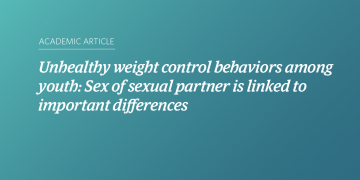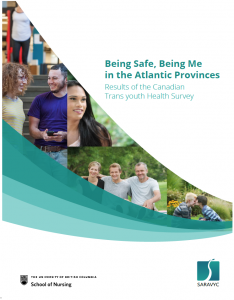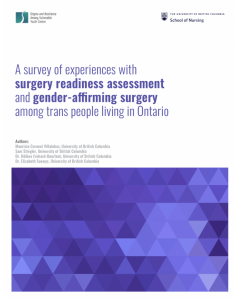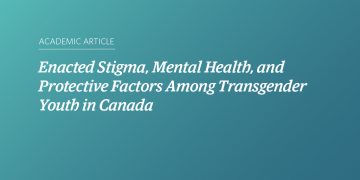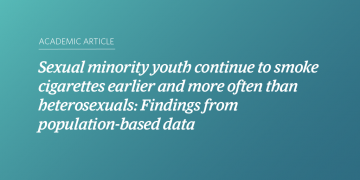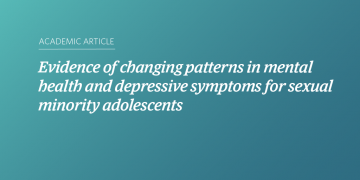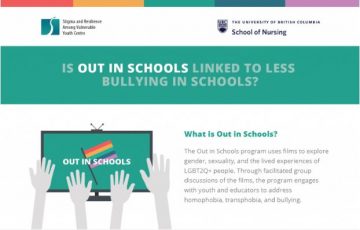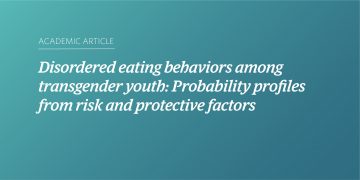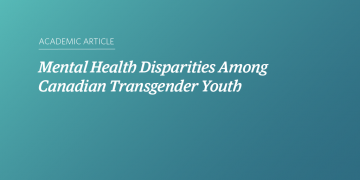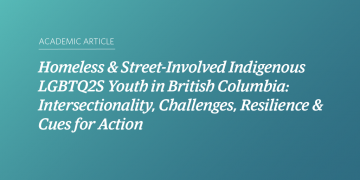Unhealthy weight control behaviors among youth: Sex of sexual partner is linked to important differences
Abstract Unhealthy weight control behaviors (UWCBs) have been decreasing for most youth over time, yet little is known whether these behaviors have changed for sexual minority (e.g., non-heterosexual) youth. This is important because many studies have found that sexual minorities report some of the highest rates of UWCBs. To determine whether or not these behaviors […]
Being Safe, Being Me in the Atlantic Provinces: Results of the Canadian Trans Youth Health Survey
The Canadian Trans Youth Health Survey was a national online survey conducted by researchers from several Canadian universities and community organizations. This report specifically examines trans youth located in the Atlantic Provinces. The survey included 122 participants from the Atlantic Provinces and used somewhat different questions for younger (14-18 years) and older (19-25 years) trans […]
A survey of experiences with surgery readiness assessment and gender-affirming surgery among trans people living in Ontario
This report is based on data from the Canada-wide Gender-Affirming Surgery Experience Survey. The survey was originally designed through a partnership between the Stigma and Resilience Among Vulnerable Youth Centre (SARAVYC) at the University of British Columbia and Trans Care BC, and resulted in a first report focused on British Columbia, which was published in […]
Sexual minority youth continue to smoke cigarettes earlier and more often than heterosexuals: Findings from population-based data
Abstract Background: An established body of research documents that sexual minority (i.e., lesbian, gay, and bisexual) populations are at higher risk for several adverse health behaviors and outcomes compared to their heterosexual counterparts. Smoking is one behavior where the gap is especially large, particularly among youth. Researchers have increasingly drawn attention to contextual determinants of […]
Evidence of changing patterns in mental health and depressive symptoms for sexual minority adolescents
Abstract Depression, sadness, low self-esteem, and self-harm affect a substantial number of young people in North America. However, the prevalence of these symptoms has been found to be consistently higher for sexual minority (i.e., lesbian, gay, bisexual) populations. In this study, we traced the trends and disparities in mental health, including self-harm, forgone mental health […]
Is Out In Schools Linked To Less Bullying In Schools?
The Out In Schools program uses films to explore gender, sexuality, and the lived experiences of LGBT2Q+ people.
Disordered eating behaviors among transgender youth: Probability profiles from risk and protective factors
Abstract Purpose Research has documented high rates of disordered eating for lesbian, gay, and bisexual youth, but prevalence and patterns of disordered eating among transgender youth remain unexplored. This is despite unique challenges faced by this group, including gender‐related body image and the use of hormones. We explore the relationship between disordered eating and risk […]
Mental Health Disparities Among Canadian Transgender Youth
Abstract Purpose This study documented the prevalence of mental health problems among transgender youth in Canada and made comparisons with population-based studies. This study also compared gender identity subgroups and age subgroups (14–18 and 19–25). Methods A nonprobability sample of 923 transgender youth from Canada completed an online survey. Participants were recruited through community organizations, health care […]
Homeless & Street-Involved Indigenous LGBTQ2S Youth in British Columbia: Intersectionality, Challenges, Resilience & Cues for Action
Street-involved youth and youth experiencing homelessness in Canada are disproportionately likely to be Indigenous: while the Canadian census estimates about 6% of youth in Canada are Indigenous, previous multi-city surveys of street-involved youth and youth experiencing homelessness in Western Canada have found more than half identify as Aboriginal, First Nations, Inuit or Métis. The authors’ […]
